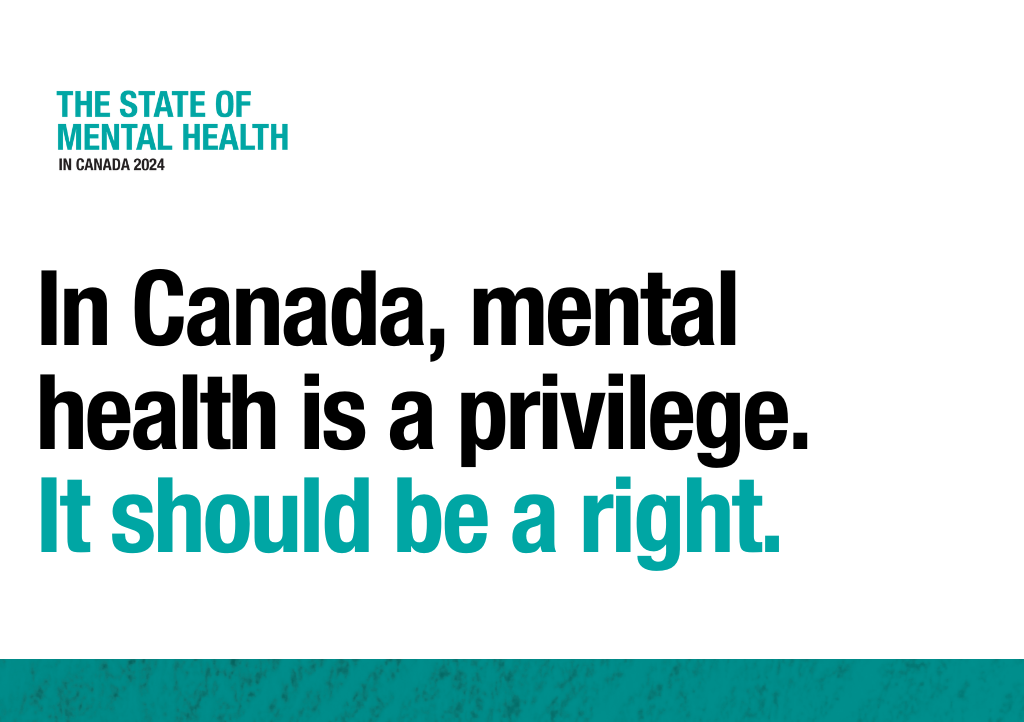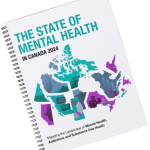Menu
Close

We aren’t expected to pay for life-saving cancer care so why are we paying for life-saving mental health care?
Nov 19, 2024
This is the first part of a two-part story about the lows and highs of mental health care in Canada.
On November 19, CMHA released The State of Mental Health in Canada 2024, a first-of-its-kind deep dive into the landscape of mental health, addictions, and substance use health care in Canada using data from across the country. So how is Canada doing in supporting the mental health of its people? Not great.
Big picture
- Mental health care is grossly underfunded, and mental health is often a privilege available only to those who can afford it.
- Access to care is inequitable geographically and socio-economically, especially for racialized and Indigenous people.
- Good, consistent data is severely lacking.

While the report paints a dismal picture, it also highlights proactive mental health, addictions, and substance use health care action being taken in every province and territory. These bright spots shine a light on the opportunity for better mental health care across Canada and provide inspiration for a roadmap for change.
Where we’re at
The most recent statistics show that the mental health of Canadians is worse than before the COVID-19 pandemic while we’re spending less (6.3%) than what peer countries are spending on mental health care (15% in France, 11% in Germany, and 9% in the UK and Sweden) as part of overall healthcare budgets. In fact, we’re not even spending what our national mental health strategy, published 12 years ago, said Canada should be spending for mental health care by now (7-9%).
More than half (57%) of people aged 18-24 who had early signs of a mental illness said that cost was an obstacle to getting mental health services. Meanwhile, people who live in poverty are more likely to have mental health problems with people with the lowest incomes reporting anxiety 2.4 times more often than those with the highest incomes. So, it’s no surprise that Canadians with poorer mental health are 50% more likely to live in inadequate housing than those reporting good mental health.
What’s contributing to the current mental health crisis?
We interviewed 13 people with lived experience of mental health concerns from across Canada including members of CMHA’s National Council of People with Lived Experience (NCPLE). Their stories shed some light on potential reasons for the mental health crisis, from stigma and systemic racism to a lack of coordination and the impact of a lack of housing. Here are some of their insights.
Negative attitudes toward mental illness and addiction contribute to inequitable care between mental and physical health
We’ve come a long way in how we talk about mental health and substance use, but there are still strong negative attitudes (stigma), particularly as they relate to addiction.
Leanne, ON: People think, ‘Oh well, you could get off drugs if you want to.’ And I’ll tell you, I thought that way as well until I had a personal experience. Without proper mental health care, no, you can’t get off them. You need them to survive in the world.
Bill, SK: Part of the stigma problem is whether people believe that mental illness as a health issue, or a lifestyle issue, or a crisis issue. It’s actually all of the above… I think people misunderstand depression and suicide, which is too bad. One of the biggest problems we face is lack of understanding about what people go through that leads them to those terrible decisions.
Sheryl, MB: I often see stigma in our community. Recently, I saw a gentleman on a bus who was talking loudly to himself be harassed and ridiculed by another passenger. Stigma still exists, and it’s very cruel.
Ailie, NS: There’s still this idea of mental illness equals weakness. Some people even say the right things when you tell them, but behind closed doors, that’s not what they’re saying. I had a colleague who was open about his mental health difficulties and people said, ‘He’s kind of strange, isn’t he?’ Or, ‘I don’t know if I can rely on him.’ And then we’re expected to deliver at a higher standard.
Lack of continuity between care and wraparound care
The people we spoke with identified gaps in care and a lack of support for navigating systems, finding housing, and securing the disability benefits they’re entitled to.
Caroline, QC: I’m grateful to have had access to therapy, but I’ve never had stable support. I’ve always had to bounce from therapist to therapist because of pointless time restrictions.
Lindsey, AB: There’s no care outside of crisis and maintenance, and I’ve lived in that space a lot in my life.
Kerry, YT: I like to believe it’s getting better, but I find people aren’t being met where they are. Mental health and addictions go hand in hand but people living with addictions are told, ‘Come when you’re clean.’ But that’s not when people need the support, we need services when we’re in the middle of something.
Bill, SK: I see so many people going through quick-fix services and it’s so depressing because they should be getting real help. They need help badly, and we’re failing them.
Systemic racism and prejudice
Racism, prejudice, and inequity are significant contributors to the assumptions people make and the kind of care people will get.
Sheryl, MB: The inequity, discrimination, and the gaps in the system are huge. When I’m struggling with my mental health, I feel confident that I’ll get help at urgent care or emergency and, because of perceived privilege, I’ll get compassionate care including a first dose of medication and a prescription to hold me over until I can get a doctor’s appointment. Many of the people I have worked with haven’t received that kind of service.
Kerry, YT: Nobody wakes up in the morning thinking, ‘I’m going to be an addict,’ or ‘I’m going to be an alcoholic,’ or ‘I’m going to live on the street.’ They’re there because they’re hurting in some way or another, and maybe they don’t even know why anymore.
Economy and housing
Not only is the soaring cost-of-living adding to Canada’s mental health crisis, but the lack of housing directly contributes to poor mental health. Gaps have formed in Canada’s social systems, and we can’t solve mental health without addressing basic needs like housing.
Pamela, BC: Impoverishment of universal health care leads to the impoverishment of individuals, and that trickles down and leads to intersecting issues like addictions and homelessness. Those things can be stopped if the social safety net is intact.
What can you do?
Your support is essential
In our next post we talk about what’s working well within the current system according to people with lived experience of mental illnesses, shining a light of hope for a better future.

